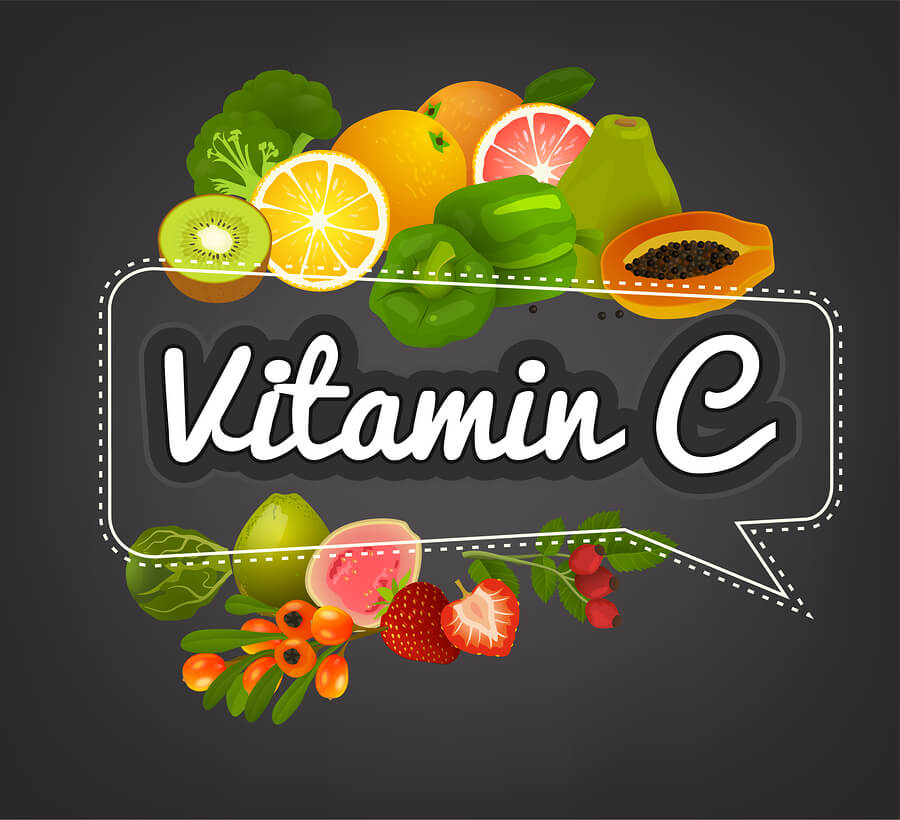Table of Contents
The Beginner’s Guide to Vitamins C
We all wish to have the perfect body and even the perfect lifestyle. How many times have you sat in a cinema and wished you were as fit as the main actor/actress of that movie? Don’t you just instantly get this reality check about how unfit you really are? That reality check eventually pushes you into a self-loathing pit of extreme sadness. I can relate.
However, this cycle of events does not necessarily have to be monotonous. You have the power and control over your lifestyle, and you are solely in charge of deciding what the tipping point will be for you in terms of your lifestyle. In order to maintain a healthy lifestyle, your primary focus should be on nutrition and your body’s dietary requirements. A vital element of any healthy diet is to include various vitamins and minerals in your daily diet.
What Are Vitamins?
Vitamins are organic compounds that are essential for your body’s nutrition and growth. There is a range of different vitamins that we know of, such as vitamin A, vitamin C, vitamin D, and vitamin E. These organic substances can be taken through a natural source or via artificial means.
One of the most significant vitamins required by your body on a regular basis is vitamin C.

So what is Vitamin C?
Vitamin C is a water-soluble vitamin, meaning it dissolves in water and is transported throughout the body. It's known for its antioxidant properties and is vital for the growth, development, and repair of all body tissues. It is involved in several body functions, including the formation of collagen, absorption of iron, the proper functioning of the immune system, wound healing, and the maintenance of cartilage, bones, and teeth.
Importance of Vitamin C
A Bastion of Antioxidant Strength
Vitamin C's role as a robust antioxidant fortifies the body's natural defense mechanisms. Antioxidants are exceptional molecules that invigorate the immune system. They execute this task by shielding the body's cells from harmful entities known as free radicals. The accumulation of these free radicals can instigate a condition referred to as oxidative stress, a precursor to various chronic diseases. Thus, by fighting against these free radicals, vitamin C contributes to the overall health and wellbeing of an individual.
Regulator of Blood Pressure
The potential of Vitamin C extends to the domain of blood pressure management. Both for individuals with standard blood pressure and those facing hypertensive issues, Vitamin C can be beneficial. Studies involving animal models have suggested that the introduction of a vitamin C supplement instigates the relaxation of blood vessels, particularly those responsible for carrying blood away from the heart. This relaxation aids in reducing blood pressure levels, promoting overall cardiovascular health.
The amplifier of Iron Absorption
Iron is a nutrient of utmost importance that performs several key functions within the body. It's indispensable for the creation of red blood cells and facilitates the transport of oxygen throughout the body. Vitamin C emerges as a key player in the body's iron absorption process. It transforms iron derived from our diet into a form that the body can absorb more efficiently, thereby enhancing the body's iron levels and, by extension, the individual's overall health.
Supporter of Immune Function
Vitamin C's involvement extends to various aspects of the immune system, making it a crucial component in maintaining good health. It stimulates the production of white blood cells, specifically lymphocytes and phagocytes, which are frontline defenders of the body against potential infections. By ensuring a robust production of these cells, vitamin C fortifies the body's immune system, thereby aiding in the prevention of disease.
Promoter of Healthy Skin
Vitamin C plays a significant role in maintaining the health and vitality of your skin. By promoting collagen production, it aids in skin repair and rejuvenation, helping you maintain a youthful appearance. Furthermore, its antioxidant properties protect your skin from damage by harmful UV rays and environmental pollutants.
Enhancer of Mood and Cognitive Function
Research suggests that Vitamin C plays a role in the synthesis of neurotransmitters, including serotonin, which is crucial for mood regulation and brain function. A deficiency in Vitamin C could lead to impaired cognitive function and mood disorders such as depression and anxiety.
Cardiovascular Health Ally
Vitamin C aids in reducing the level of bad LDL cholesterol and triglycerides, which are known to contribute to heart diseases. Also, its antioxidant properties help to prevent oxidative damage to the heart and blood vessels, thus reducing the risk of heart disease.
Aid in Preventing Age-Related Eye Disorders
High intake of Vitamin C has been linked to a reduced risk of cataracts and age-related macular degeneration. It helps to keep your eyes healthy by protecting them against oxidative stress, an imbalance that damages the eye's cells.
Guardian Against Gout Attacks
Gout is a type of arthritis that affects millions worldwide. Studies have found that Vitamin C, when consumed in sufficient amounts, can help lower the uric acid in the blood, thereby reducing the risk of gout attacks.

Best Sources of Vitamin C
Vitamin C, a vital nutrient for maintaining good health, is abundantly found in a range of fruits and vegetables. Let's explore some of the most potent sources of this essential vitamin:
Citrus Fruits
Citrus fruits are renowned for their high vitamin C content. This category includes oranges, which are often the first fruit people think of when vitamin C is mentioned. Yet, other citrus fruits such as grapefruits, lemons, and limes also offer a generous vitamin C contribution, making them an excellent choice to incorporate into your daily diet.
Berry Varieties
Berries are not just delicious; they're also packed with vitamin C. Strawberries stand out in this group, boasting a high concentration of vitamin C. Raspberries and blueberries follow suit, providing a good dose of this essential nutrient while adding delightful flavors to your diet.
Kiwi Fruit
The tropical kiwi fruit, with its vibrant green flesh and unique taste, is another powerhouse of vitamin C. Adding this exotic fruit to your diet not only enriches your palate but also contributes significantly to your vitamin C intake.
Bell Peppers
Bell peppers, both red and green variants, are not only versatile culinary ingredients but also excellent sources of vitamin C. Their bright colors and crunchy texture add visual appeal and variety to your dishes while offering a substantial vitamin C boost.
Green Leafy Vegetables
Green leafy vegetables might not be the first thing that comes to mind when you think of vitamin C, but many of them hold significant amounts of this vitamin. Vegetables such as spinach, kale, and broccoli are rich in vitamin C and should be a staple in your diet to ensure you get a varied, balanced intake of essential nutrients.

Recommended Dosage of Vitamin C
The appropriate daily intake of vitamin C is dependent on various factors such as age, gender, and specific life stages. However, in the context of the general adult population, the standard recommended daily dosage fluctuates between 65 to 90 milligrams (mg). The established upper threshold, which represents the maximum intake that's unlikely to cause harm, stands at 2,000 mg per day.
It's crucial to recognize that excessive consumption of vitamin C may result in an array of side effects. These could range from relatively minor disturbances like diarrhea, nausea, and vomiting to more discomforting symptoms such as heartburn, abdominal bloating, and cramping. In some instances, individuals might even experience headaches.
Given these potential side effects, it's highly advisable to seek professional healthcare advice prior to initiating any regimen involving vitamin C supplements. This approach ensures a safe and beneficial usage of vitamin C tailored to your specific health profile and needs.
The Role of Vitamin C in Skin Health
The contribution of Vitamin C towards skin health is not only significant but also multifaceted. This essential vitamin is frequently found in numerous skincare products, owing to its proven benefits for maintaining a youthful and vibrant complexion.
Collagen Production and Anti-Aging
One of the primary roles of Vitamin C in skin health involves its capacity to stimulate collagen production. Collagen is a vital protein that gives your skin its structure, elasticity, and strength. As we age, collagen production naturally slows down, leading to common signs of aging such as wrinkles and sagging skin. By boosting collagen synthesis, Vitamin C helps maintain your skin's firmness, effectively counteracting age-related changes and contributing to a smoother and more youthful appearance.
Antioxidant Properties and UV Protection
In addition to promoting collagen production, Vitamin C also boasts powerful antioxidant properties. These come into play in defending your skin against harmful environmental factors, notably ultraviolet (UV) radiation. Overexposure to UV rays from the sun can cause premature aging of the skin (photoaging), characterized by wrinkles, fine lines, and age spots. By neutralizing harmful free radicals produced during UV exposure, Vitamin C can help combat this damage, providing an additional layer of protection for your skin.
The Wonders of Vitamin C for Skin Health
Vitamin C's diverse benefits for skin health extend far beyond its role in collagen production and UV protection. Let's delve into the specific ways in which this potent nutrient contributes to a healthy and radiant complexion.
Stimulating Collagen Production
Vitamin C is an indispensable player in the synthesis of collagen – a structural protein that lends our skin its firmness and elasticity. Maintaining ample levels of collagen is paramount to preserving a youthful and resilient complexion. When the skin is rich in collagen, it appears supple, firm, and radiates a youthful glow.
Shielding Against Sun-Induced Damage
Overexposure to the sun's rays can fast-track the skin aging process. Vitamin C comes to the rescue with its potent antioxidant properties, shielding the skin from damaging free radicals triggered by UV exposure. This protective role helps prevent the signs of premature aging, such as fine lines and sunspots.
Brightening the Skin
Vitamin C has the unique ability to inhibit melanin production, the pigment responsible for skin color. This regulatory role can lead to a brighter and more evenly-toned complexion. By reducing melanin synthesis, Vitamin C can help diminish the appearance of hyperpigmentation and dark spots, revealing a more luminous skin tone.
Accelerating Wound Healing
Vitamin C's involvement in collagen production is also beneficial for wound healing. It facilitates the regenerative process of the skin, helping to repair damaged skin faster. Whether it's a cut, burn, or an acne scar, the healing process can be notably hastened with adequate Vitamin C levels.
Diminishing Under-Eye Circles
Lastly, Vitamin C can play a vital role in combating stubborn under-eye circles. By promoting an even skin tone and reducing pigmentation, Vitamin C can help lessen the appearance of dark circles under the eyes, leaving you with a more refreshed and vibrant look.

Vitamin C Deficiency: Signs and How to Avoid It
Although Vitamin C deficiency is relatively rare in most regions of the world today, inadequate intake of this crucial nutrient can result in a medical condition known as scurvy. Scurvy is characterized by various symptoms, including fatigue, gum inflammation, joint pain, anemia, and skin-related issues. To safeguard your health, it's vital to recognize the signs of Vitamin C deficiency and know how to prevent it.
Identifying the Symptoms of Vitamin C Deficiency
Certain signs can indicate a potential lack of Vitamin C in the body. Here are the common symptoms associated with this deficiency:
Fatigue and General Weakness
These symptoms often surface as the initial signs of Vitamin C deficiency. A constant sense of tiredness and lack of energy, even without excessive physical activity, may suggest a low level of this vitamin.
Dental Issues: Swollen and Bleeding Gums
The health of your gums is closely linked to Vitamin C levels, primarily because of the vitamin's role in collagen production, crucial for gum health. Swollen and bleeding gums are common signs of Vitamin C deficiency.
Compromised Wound Healing
Vitamin C plays a vital role in the wound healing process. If you notice a delay in healing or complications arising during the process, it could indicate a deficiency of this essential nutrient.
Joint Pain
A lack of Vitamin C can result in joint inflammation and discomfort. The vitamin is key to collagen production, which is important for joint health. Hence, joint pain could be a sign of its deficiency.
Anemia
Vitamin C is integral to the absorption of iron, a mineral necessary for the production of red blood cells. Therefore, a deficiency in Vitamin C can result in anemia, a condition characterized by a lack of healthy red blood cells or hemoglobin in the blood.
Preventing Vitamin C Deficiency
To prevent a deficiency, consume a diet rich in vitamin C, preferably from fruits and vegetables. In some cases, vitamin C supplements may be recommended. Always consult your healthcare provider before starting a new supplement regimen.
Strengthening Immune Function with Vitamin C
Our immune system's efficacy is intricately linked to the nutrients we ingest, and Vitamin C stands at the forefront of these essential nutrients, profoundly impacting our body's defense mechanisms. Being a potent antioxidant, Vitamin C plays an instrumental role in bolstering the immune system by sustaining the cellular functions vital to its operation. Incorporating Vitamin C-rich foods or supplements into your daily diet can significantly boost your immune capabilities and contribute to your overall wellbeing.
The Immune-Boosting Power of Vitamin C
Vitamin C is known for its antioxidative prowess, which aids in combating harmful free radicals within the body. This helps in maintaining the integrity of our cells, including those involved in immune function. By strengthening our immune cells, Vitamin C enhances their ability to defend the body against various pathogens, thereby strengthening our overall immune response.
Moreover, Vitamin C aids in the production and function of white blood cells, the body's primary defense soldiers. These cells help identify and eliminate foreign invaders, such as bacteria and viruses, keeping us healthy and disease-free.
Regular intake of Vitamin C, either through a balanced diet or through supplements, can therefore supercharge your immune system. By ensuring that your body gets an ample amount of this nutrient, you're bolstering your immune function and fortifying your health.
The Role of Vitamin C Supplements in Your Dietary Regimen
While deriving nutrients from whole food sources is the optimal approach, there may be circumstances when meeting the recommended daily intake of vitamin C through diet alone proves challenging. This is where vitamin C supplements come into play. They are available in a multitude of forms such as tablets, capsules, and effervescent tablets, making it easier to reach your nutritional goals. However, it's important to consult your healthcare provider before incorporating any new supplements into your regimen.
Understanding vitamin C's multifaceted role in our health, in more depth, equips us with the knowledge to make informed decisions concerning our dietary habits and lifestyle choices. This can direct us towards a path of optimal health and well-being, allowing us to fully harness the benefits of this essential nutrient.
Final Thoughts on Vitamin C
Vitamin C is a crucial nutrient for human health, playing an essential role in various bodily functions. By incorporating a variety of vitamin C-rich foods into your diet, you can ensure your body gets adequate amounts of this essential vitamin, contributing to your overall health and wellness.
To conclude, understanding the importance of vitamins, particularly Vitamin C, and their role in our overall health and well-being, is the first step towards adopting a healthy lifestyle. So, start today and take a proactive approach to your health!




Comments
Loading…